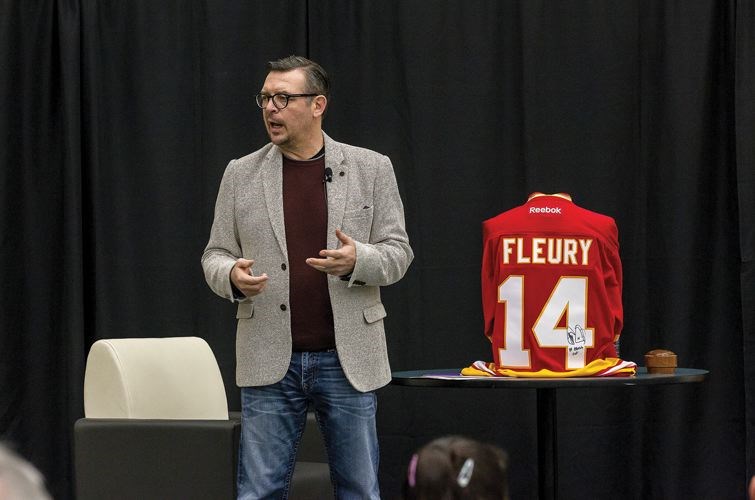Theo Fleury's life has been one of monumental triumphs and a suicidal low. And he wouldn't change anything, because, taken as a whole, his disparate experiences have brought him to where he is today.
Fleury, a Stanley Cup champion and Olympic gold medalist who reached the pinnacle of the hockey world despite having to carry the demons of childhood sexual abuse, alcoholism and drug addiction, was the keynote speaker at the UNBC Timberwolves Legacy Breakfast Tuesday morning at the Northern Sport Centre. Fleury told his story - free of whitewashing - to an audience of about 500 mesmerized people. His listeners were silent until the conclusion of his address and then thanked him for his powerful words by way of a lengthy standing ovation.
Telling his story is what Fleury does these days. Talking about the abuse he suffered during his junior hockey career is part of his healing process. By shining an unapologetic light on what was long considered a taboo subject, he has also given countless other Canadians a measure of hope and a chance to reclaim their own lives. Connecting with victims of childhood sexual abuse and helping them find their way out of pain and anger has become Fleury's guiding purpose.
So no. Even though his personal history includes long periods of time in unimaginably dark places, he wouldn't change a thing.
"I think that everything happens for a reason," Fleury said after the breakfast, a fundraiser for UNBC athletics. "Although there were a lot of uncomfortable times, a lot of difficult times, the human spirit is pretty amazing when you sort of tap into it and you're sort of awake and participating in your own life. Amazing things happen. I get to travel and meet incredible people every day who have had the same experience as me and are doing well or are at the beginning of their journey (of healing), which is really cool."
Fleury, a 1989 Stanley Cup winner with the Calgary Flames and an Olympic champ with Team Canada in 2002, wrote about his experiences - good and bad - in a 2009 best-selling autobiography called Playing with Fire. While on an early promotional tour for the book, in which he revealed the abuse inflicted upon him by hockey coach Graham James, he met a man who influenced what was to come next - Fleury's post-hockey career as a public speaker.
As Fleury told it Tuesday morning, the man was in a long lineup to have his copy of Playing with Fire signed, and when he finally got to the front, he looked Fleury in the eye and said, "Me too."
It was a life-changing moment for Fleury. He realized he wasn't alone in the trauma he had suffered and knew he needed to start talking about being a victim of sexual abuse. By talking, he saw a way to help himself and others who had been victimized as children.
"I know what it's like to carry around a secret and not being able to tell it so it's really cool when people come up and tell me their stories," he said.
Fleury now works close to 365 days a year, he said, delivering his words of empowerment in one form or another.
"Pretty much," he said.
"I'm dealing with people or emailing or on social media or whatever it is. When you tell your story you have to be available to people because you never know when they're going to find that courage to come forth."
Statistics show that in Canada one in three girls and one in six boys experience an unwanted sexual act. Fleury told Tuesday's crowd "the stats don't lie."
So, wherever he speaks, he said he knows he's among people who are victims of abuse.
"You have 500 people in a room, you just do the math," he said. "I know that I'm speaking directly to people who maybe have had the same thing happen to them, and that they can talk about it. And not only can you talk about it, talking about it is how you get through it."



